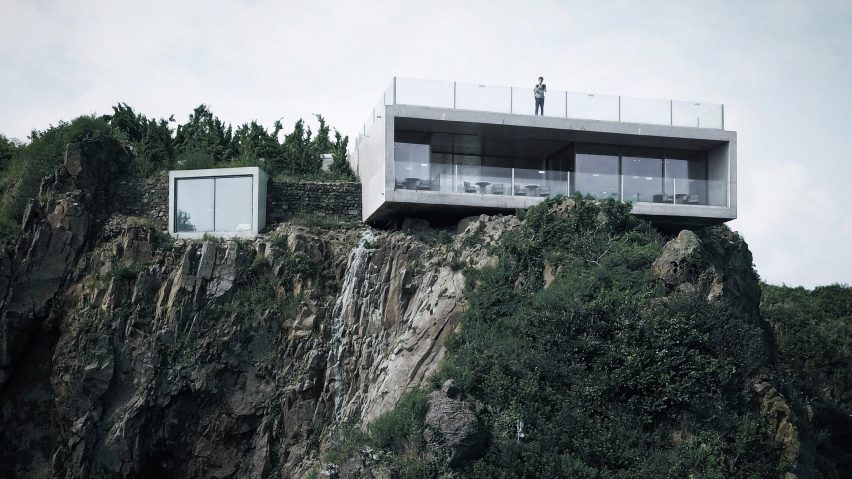After Junya Ishigami unveiled a kilometre-long art museum that emerges from an artificial lake, Dezeen rounds up 10 recent Chinese architecture projects that play with arresting landscapes.
Japanese architect Ishigami said he wanted his project to address a tendency for buildings in China to be "closed off" from their environment.
But he is not the first to explore these themes in the country. Over the past few years, multiple architecture projects in China have sought to enter a dialogue with their surroundings to striking effect, often as part of initiatives to encourage tourism in rural areas.
Read on for 10 examples from Dezeen's archives:
Zaishui Art Museum, Shandong, by Junya Ishigami
The latest in a series of mind-bending projects by Ishigami, the Zaishui Art Museum is a kilometre long, with a gently undulating concrete roof topping parallel columns planted in the bottom of an artificial lake.
Glass panelling is fitted between the columns, with carefully placed gaps that allow water to flow into the building and submerge parts of the floor to create the impression that the building has risen from the water.
Find out more about Zaishui Art Museum ›
Cloud Tea Room, Zhejiang, by Plat Asia
Another recent Chinese project that seeks to blur the boundary between architecture and landscape is this teahouse for a resort in Huzhou by Beijing studio Plat Asia.
The modest building is located on a secluded hillside of tea fields, within an installation of steel poles that periodically release water vapour to make visitors feel as if they're among the clouds.
Find out more about Cloud Tea Room ›
Water Drop Library, Guangdong, by 3andwich Design
Set on a hillside above Shuangyue Bay, the circular Water Drop Library is topped with a pool overlooking the sea.
Chinese studio 3andwich Design said it wanted the library to have a "poetic tension", arising from the combination of its bold geometric forms and its intimacy with the natural landscape.
Find out more about Water Drop Library ›
Jiunvfeng Study, Shandong, by Gad Line+ Studio
Mount Tai, China's most famous sacred mountain, has been climbed by worshippers for 3,000 years.
According to Gad Line+ Studio, this visitors' centre on the mountainside was intended to resemble "a floating cloud", with curving glass walls and a white membrane stretching over the lightweight steel rooftop.
Find out more about Jiunvfeng Study ›
The Hometown Moon, Shandong, by Syn Architects
Also on Mount Tai, a road leads down from Jiunvfeng Study through the mountain and ends with a ceremonial hall designed by Syn Architects to resemble "a moon that never sets".
A giant semicircular window sits on the edge of a pool of water, reflecting on it when illuminated to create the shape of a full moon.
Find out more about The Hometown Moon ›
Yuandang Bridge, Shanghai, by Brearley Architects + Urbanists
Brearley Architects + Urbanists weaved a 586-metre bridge across Shanghai's Yuandang Lake with the intention of blending architecture, infrastructure and landscape.
The crossing connects two areas of wetland and features a planted central area as well as seating, play spaces and a sculptural pavilion.
Find out more about Yuandang Bridge ›
Cliff Cafe, Shandong, Trace Architecture Office
The appropriately named Cliff Cafe, by Beijing studio Trace Architecture Office, sits perched atop a sheer drop on Jiming Island.
It is embedded into the rock face and its concrete structure was left exposed to give patrons the feeling of entering part of the landscape as they descend the rooftop staircase.
Find out more about Cliff Cafe ›
Jinyun Quarries, Zhejiang, by DnA_Design and Architecture
Chinese studio DnA_Design and Architecture sought to work closely with a man-made landscape with this series of cultural spaces at an abandoned stone quarry.
Through light-touch insertions into the hand-excavated pits, it created a library, a performance venue and a space for gatherings.
Find out more about Jinyun Quarries ›
The Chapel of Sound, Beijing, by Open Architecture
The Chapel of Sound is a monolithic semi-open-air concert hall nestled in a valley next to ruins of the Great Wall of China.
Designed by Beijing-based studio Open Architecture, it is built entirely from concrete that has been enriched with an aggregate made from local stone to give it the appearance of a giant boulder that has always been part of the landscape.
Find out more about The Chapel of Sound ›
Treasure Box in the Desert, Ningxia, by 3andwich
Another project by 3andwich Design, this building in the Ningxia Hui Autonomous Region is intended to draw on the mythology of the desert.
Housing facilities for a nearby campsite, it is covered in a weathered-steel shell to help create the sense that it has been dug out from beneath the sand.
Find out more about Treasure Box in the Desert ›

